|
April 19, 2018
Alcoa Pensions Under Threat
Alcoa Corporation Attacks
Salaried Employees' Pensions
PDF
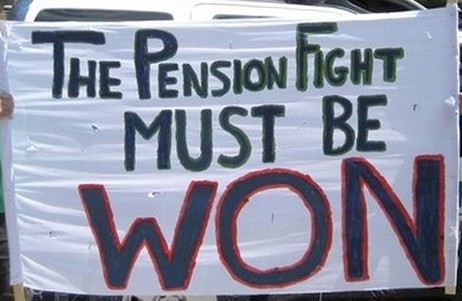 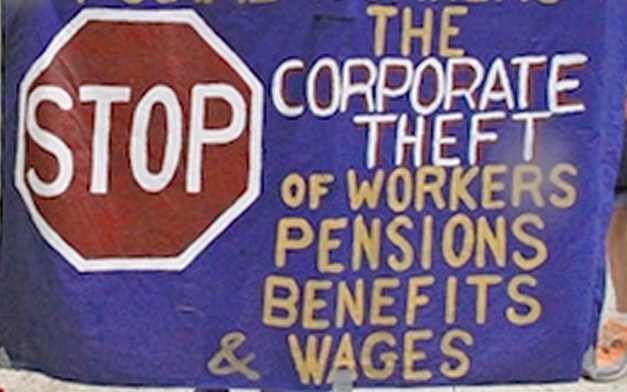
Alcoa
Pensions
Under
Threat
• Alcoa Corporation Attacks Salaried Employees'
Pensions
• Financial Vultures Circle Alcoa and Arconic
Employees
• Alcoa Keeps Demanding Concessions from All
Employees
Canadian Pacific
Workers Prepare for Strike
• All Out to Support the Just Struggle of
Railway Workers for Their Rights!
• CP Workers Determined to Defend Their
Rights and Dignity
Quebec Bill 152
Criminalizing Construction Workers
• "Free Competition" Used as Weapon to Attack
Workers' Rights - Pierre Chénier
Alcoa Pensions Under Threat
Alcoa Corporation Attacks
Salaried Employees' Pensions
Alcoa has unleashed a broad attack against the pension
rights of its salaried employees in the U.S. and Canada. Alcoa has six
operations in the U.S. and three in Quebec. Alcoa unilaterally
announced the termination of the existing defined benefit plans for
all 800 current salaried employees throughout North America. Alcoa
salaried workers do not have any organized collective defence. Those in
control of the monopoly simply announced in a press release the ending
of the defined benefit pension plan and its replacement in Canada with
a defined contribution savings plan and in the U.S. with a 401(k)
savings plan.

Alcoa said the existing defined benefit pension plans
will close on December 31, 2020, and be replaced the
following day with savings plans. This attack on the workers' right to
pensions will effectively remove the pensions of salaried employees
from the company's balance sheet and "strengthen it" according to Roy
Harvey,
Alcoa President and Chief Executive Officer.
Future retirement earnings will have to come from the
employees' individual savings plans. Guaranteed retirement income will
be severed from any social responsibility of the company to which
workers sell their capacity to work, which of course no longer exists
upon retirement, at least in its current form. Needless to say, the
revenue that
will "strengthen the balance sheet" has nothing to do with improved
production or efficiency but will come directly out of both the current
and retirement incomes of salaried workers.
The Alcoa CEO levelled the standard anti-worker insult
that the concession he forced on workers was necessary "to reduce our
liabilities [and] enable us to better prepare for an uncertain and
cyclical environment as we position our company for the future." The
"our" "us" and "we" are the imperialist owners who insist on increasing
their
expropriation of the new value workers produce at the expense of the
workers, including the salaried employees, both when active and retired.
Alcoa's attack on the defined benefit pensions of
salaried employees goes against the trend of history to affirm the
rights of all, including the right to a guaranteed standard of living
in
retirement. The imperialists encourage salaried employees to think
their future security and well-being lies with the financial oligarchy
and its continued rule and
class privilege, and not in uniting with the broad working class in
defending the rights of all and charting a new pro-social direction for
the economy. Alcoa's unilateral attack on employees' pension security
should encourage salaried workers to grasp that the trend of history is
to unite as one working class in the defence of rights, against the
imperialists and for a new pro-social direction.
Hands Off Workers' Pensions and
Benefits!
Fight for Defined Benefit
Pensions for All!
Note
Alcoa holds a 74.9 per cent stake in the
Aluminerie of Bécancour Inc. with Rio Tinto holding the
remaining 25.1 per cent. Alcoa has locked out the 1,030
smelter workers at ABI since January 11, 2018 demanding
concessions, and is using salaried employees to continue limited
production. Those salaried
employees should think carefully about where their loyalty should lie,
with the oligarchs who have attacked them or with their fellow Quebec
workers who are their natural allies. Local management has said it has
no mandate from its head office in the U.S. to negotiate a new
collective agreement.
In addition to the destruction of the salaried workers'
defined benefit pension plan, Alcoa also announced in the oligarchs'
customary vulgar anti-worker language that it "will no longer
contribute to retiree medical coverage for its U.S. salaried employees.
The company anticipates that the change will reduce its liabilities by
U.S.$35
million."

Financial Vultures Circle Alcoa and
Arconic Employees
Reports say that immediately after the news broke that
Alcoa was eliminating the defined benefit pensions of its salaried
employees, the big insurance cartels and their agents began to pounce
on those workers. They sent out circulars and advertisements advising
U.S. Alcoa employees "to begin a personal savings program with them to
mitigate the benefit reduction from the elimination of the Alcoa
defined benefit plan."
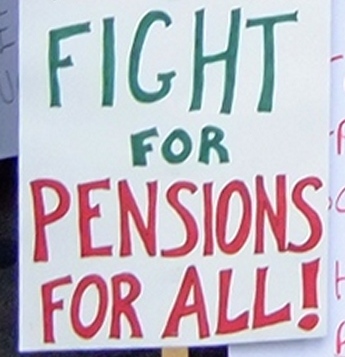
This effort was ramped up even more when Arconic Inc.,
the spinoff company Alcoa recently created when it split in two,
announced it will "freeze defined benefit pension plans for
approximately 7,900 of its U.S.-based salaried and non-bargaining
hourly employees. The freeze will take effect on
April 1, 2018."
The financial sharks prey on the climate of insecurity
with such headlines as "Alcoa's 401(k): A Poor Replacement for
Alcoa's Pensions" and reprints of articles such as one from the Wall
Street
Journal
bemoaning the uncertainty of savings plans, "The
Champions of the 401(k) Lament the Revolution They Started."
One agent of the financial cartels, Blueprint Income
Inc., ran a series of ads targeting Alcoa and Arconic workers saying in
one, "While a 401(k) is one way to accumulate assets, it fails to
provide financial stability and guarantees during retirement," and in
another, "Employees can use their 401(k) savings to purchase from
us a
Personal Pension or income annuity to secure retirement income."
Another item says, "While pensions as structured by
Alcoa and other corporates stopped being the appropriate retirement
solution from the employer perspective, their replacement was never
meant to be the 401(k). 401(k)s were created for senior
executives, who already had maxed out their pensions, to accumulate
more wealth to
support their retirement lifestyles.... Since they don't offer any
guarantees or protection from the market or your own
longevity, 401(k)s just cannot provide financial stability in
retirement."
The alternatives Blueprint suggests require current
income from wages and salaries be invested with them in one way or
another, which however come with hefty user fees. The ads impress upon
workers the necessity to act now, not in defence of their right to the
defined benefit pensions the company is ending, but to invest their
earnings in
Blueprint and its associated insurance companies.
Blueprint writes in an ad titled, Arconic's Pension
Freeze is a Call to Action for Employees:
Pension Freezes in 2018
mean affected Arconic employees need to act quickly. It's clear that
companies ... don't want to manage pension plans. Private pension plan
options are becoming increasingly popular, and we at Blueprint Income
would suggest two alternatives for Arconic employees to mitigate the
pension gap resulting from the pension freeze and to increase
guaranteed lifetime income.
Arconic's Pension Freeze Alternative 1
-- The Personal Pension
We believe this to be the
best option for all Arconic employees. The Personal Pension is the next
best thing to an employer pension and a way for you to get a
pension-like income in retirement without your employer. Instead of
being provided by employers, it's backed by insurers, like an annuity.
But, unlike the average annuity, you can
purchase it in small amounts over time.
Arconic's Pension Freeze Alternative 2
-- Buy an Income Annuity
An alternative is to buy a
traditional income annuity.... Income annuities provide the financial
security that you get from a guaranteed lifetime income stream that
comes each month for as long as you're alive. They're ways to increase
your pension check.
At Blueprint Income, we
offer income annuities from more than 15 top-rated insurance
companies. Click below to get real-time personalized quotes, where you
can compare options offered from different insurers on an
apples-to-apples basis.
"Apples-to-oranges" where a pension is an apple and a
savings plan is an orange -- two different fruits indeed. Savings plans
require deductions from current income and guarantee a retirement
benefit for only as long as the savings do not run out.
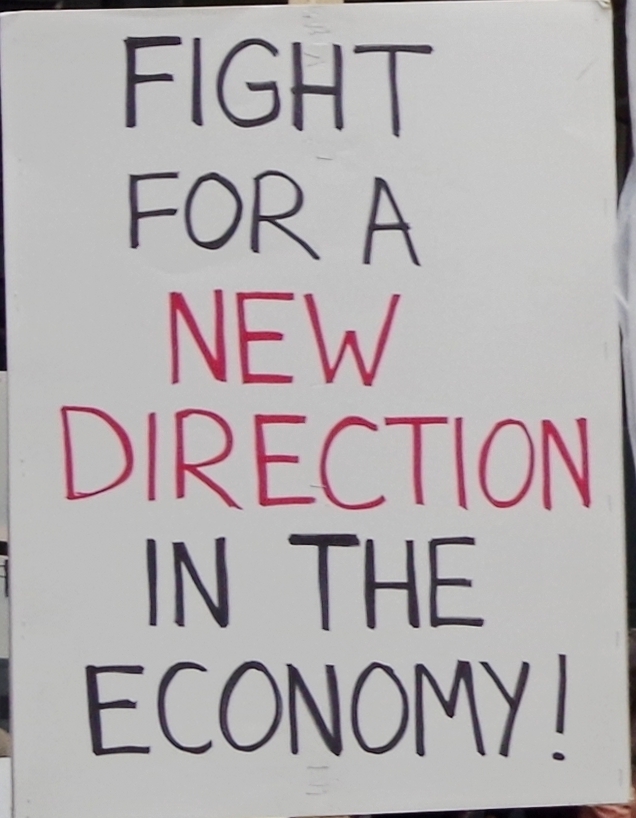
This stinks of collusion and corruption of the sort
Canadian workers have seen with the connection between the federal
Liberal Finance Minister and his family's private pension company. It
has become clear that the financial oligarchy is squeezing workers from
all angles during the anti-social offensive. The investment cartels not
only own
and control the monopolies such as Alcoa and Arconic, which are
destroying the defined-benefit pension plans, but also the "top-rated
insurance and pension companies" that are demanding workers hand over
their income to them as savings plans and insist on "managing" their
savings.
Those who own and control the socialized economy and
its parts refuse to guarantee the security and well-being of those who
work and produce the value the rich oligarchs crave and expropriate to
finance their lavish lifestyles and class privilege. The "person of
state" is also failing in its social responsibility to defend the
people and their
well-being and security from birth to passing away.
The reality of the situation demands the working class
take up its social responsibility to defend itself and society as the
imperialists and their institutions will not do so. The necessity is
for the working people to organize and build their own institutions to
defend their rights in the present and fight for a new direction for
the economy that
guarantees the well-being and security of all.

Alcoa Keeps Demanding Concessions
from All Employees
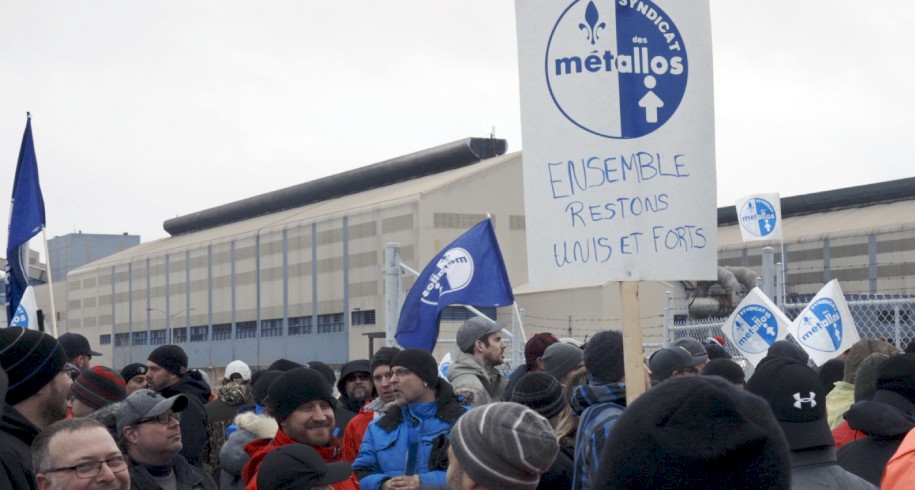
Mass picket outside plant by locked-out Aluminerie de Bécancour
Inc., January 2018.
The announcement that both Alcoa and Arconic are
unilaterally eliminating the defined benefit pension plans for salaried
and non-union employees underscores the demand of the imperialist
oligarchs for concessions from all workers.
Alcoa has currently locked out its 1,030 workers
at the Aluminerie de Bécancour Inc. demanding concessions on a
wide range of issues, all within a secret agenda that includes forcing
the price of aluminum to go higher. The smelter workers' union, United
Steelworkers
Local 9700, immediately denounced the lockout as an odious measure
with
a hidden agenda. As far back as last November, Alcoa demanded unionized
workers at ABI accept the destruction of their defined benefit pension
plan, starting with its closure to all new hires.
Members of USW Local 9700 rejected the demand with
contempt and said
at the time, "[Steelworkers] categorically reject a discriminatory,
inferior pension plan for the next generation of workers."
In its attack on defined benefit pensions, Alcoa hopes
it can split old and new workers, and salaried and hourly employees by
keeping defined benefit plans open for current hourly employees only,
eliminating the defined benefit plans for salaried employees and
offering a savings plan for them and all new hourly workers. The scheme
to split
the working class would then weaken working class resistance to
concessions on all fronts, including existing defined benefit pensions,
seniority, the use of casual and contract work to attack regular
workers, and to deny the right of unionized workers to move into new
positions created from technological developments.
Local 9700 highlighted last November that workers
at Ciment Lafarge and Resco Products Inc. both went on strike in
opposition to concessionary demands designed to split the working
class. The local said workers at ABI likewise reject such attacks and
are determined to defend their rights. Steelworkers and their
supporters call on
workers across Quebec and Canada to join them in their resistance
struggle against concessions and for the affirmation of the rights of
all.

Canadian Pacific Workers Prepare for
Strike
All Out to Support the Just Struggle of
Railway Workers for Their Rights!
On April 17, the Teamsters Canada Rail Conference
(TCRC) announced that it had formally given 72-hour notice of intent to
strike to Canadian Pacific Railway (CP). In a press release, TCRC says
that in the event that the parties are unable to reach a negotiated
settlement, more than 3,000 conductors and locomotive engineers will
exercise their legal right to strike on Saturday, April 21, at 0:01 am.
CP workers could also be locked out by the company. Workers at CP voted
94.2 per cent to authorize strike action on April 6. The collective
agreement with CP expired on December 31, 2017. Negotiations began on
November 16, 2017, and federal mediators were brought in on January 29.
The TCRC notes that CP's profit in 2017
reached $2.4 billion, up
by $1 billion since 2014, even as sales were little changed
over the
same period. The union attributes the rising profits, despite stagnant
sales, to cuts, layoffs, closures, and punitive discipline. It also
points out that CP forces train crews to be
available 24/7 while pushing them to work well beyond their point
of
exhaustion.
"Despite our best efforts to negotiate in good faith,
we have come
to a point where Teamsters are prepared to go on strike for the third
time in six years to obtain a fair and reasonable contract renewal,"
said Doug Finnson TCRC President. "We will do everything in our power
to reach a negotiated settlement at CP, but one that is acceptable
to our members and that addresses the major issues that exist with this
employer."
The TCRC also gave a brief overview to its members of
how negotiations with CP are proceeding:
|

CP Rail workers picket during 2015 strike.
|
"As you are aware the Company has agreed with very
little that we
have proposed. The Company continues to insist on concessions and the
decimation of our rest and other Collective Agreement provisions and
has made little movement in regards to their demands to diminish your
working conditions. Our bargaining committee is not willing
to accept these concessions in order to achieve provisions that allow
us to adopt a system in our workplace that allows us to work properly
rested and in accordance with proper sleep science principles."
In a recent press release dated April 14, TCRC
states, "[CP] is
attempting to manufacture a crisis to force government intervention and
avoid bargaining with the Teamsters." The union says CP admitted to it
that they prefer government intervention over negotiations.
"Arbitration leads to better outcomes for the
company. Bargaining in a way that leaves the union no choice but to
take strike action is one way to force an arbitrated settlement, at the
expense of their customers and the economy," the press release says.
The union press release also states that cases filed
with the
Canadian Railway Office of Arbitration and Dispute Resolution regarding
dismissed CP workers have risen 500 per cent since the company
imported
a U.S.-based system of labour relations in 2012. This system is
based on
firing and suspending workers. Last year
saw the most cases on record for arbitrating dismissals of CP workers,
according to the TCRC, and the union's records go back 100 years.
"CP's adversarial labour relations strategy has failed
miserably.
There is overwhelming evidence that this discipline-based style of
labour relations cannot function in Canada and has driven the parties
apart," said TCRC President Doug Finnson.

CP Workers Determined to Defend
Their Rights and Dignity
CP railway workers are actively preparing for a strike
or lockout.
They are facing a rabid anti-worker regime, especially since 2012
when a
U.S.-based management took control of the rail monopoly and Hunter
Harrison was appointed CEO. Harrison resigned from his position last
year but the new management is following his vitriolic
anti-worker practice.
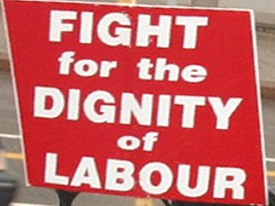
In 2012, CP refused to negotiate and presented
workers with impossible concessionary demands, including cuts to
pensions and
benefits and changes of work rules to force them to work longer
hours without proper rest periods. The refusal of management to
negotiate gave workers no option but to strike, which the
Harper federal government immediately ended with back-to-work
legislation.
The combination of management's refusal to negotiate
and legislative
action was an obvious setup. The government and management together
created hysteria in the country that CP workers were "harming the
economy" and the "national interest," which necessarily required a
legislated end to the strike and binding arbitration, instead of
negotiations in good faith during a strike struggle where workers lose
pay and the company loses profits.
No headway has been made since to sort out the issue of
work
fatigue and work schedules, which are critical issues facing railway
workers. Importantly, the workers who do the work and know the risks
involved with their working conditions, are determined to have a
decisive say on these issues which are increasingly a concern not only
for
the workers but for the public. Workers refuse to have their say and
concerns dismissed under the hoax that a system of arbitration forced
on them through legislation can replace a system of labour relations
and good faith negotiations where workers have the right to withdraw
their capacity to work, in a strike, so as to reach an arrangement of
equilibrium.
A similar scenario to 2012 played out in
early 2015 when CP workers
went on strike and again the federal government immediately announced
back-to-work legislation. The mass media promoted the disinformation
that the two parties then "agreed to binding arbitration" ending the
strike without legislation. The truth of the matter
was state-organized blackmail in collusion with Canadian Pacific to
force binding arbitration and deny workers' right to strike. This was
excused under the hoax that CP Rail's continued operation and right not
to negotiate in good faith with its workforce are equated with "the
national interest" and to "protect the economy from
harm."
Beyond the routine state-organized intervention to deny
collective
bargaining, CP management consistently violates the collective
agreement with impunity, knowing that workers cannot strike
effectively.
Firings of workers and unilateral changes in working conditions are
happening regularly. The standard answer from CP is that if workers
disagree with these violations of the collective agreement they can
grieve and go to arbitration. Subsequently, the backlog of grievances
filed by railway workers has become massive.
Massive too is the number of cease-and-desist orders
that the
railway industry arbitration regime has issued against CP. The
situation is considered so dire that a very rare occurrence happened in
January 2016. Transport Canada itself issued an order to CP
demanding
the company change its freight train line-ups and fatigue-management
practices in British Columbia because they posed "an immediate threat
to safe railway operations."
A Transport Canada inspector ruled that CP was not
including as time
on duty, the transit time to and from the away-from-home rest facility
for workers at an away-from-home terminal. This meant crews were not
allowed to book rest time when their duty was cancelled resulting in
insufficient time to plan for sleep prior to a possible call back
to duty. The result was cases of extreme fatigue knowingly caused to
workers at the expense of their wellbeing and safety and that of the
public.
The Transport Canada ruling was most unusual for an
institution
that has acted to deregulate the rail industry to serve the private
interests of the railway/financial cartels. The unusual ruling shows
the extent to which the CP rail monopoly has imposed dangerous working
conditions on rail workers in violation of their collective agreement
and
industry standards.

Workers report that they win most of their grievances,
but these
are very costly for the union. As well, they keep occurring because CP
and the other rail monopolies know that they are not going to be held
to account by the state, which in fact is trying to suppress the
struggles of the workers under the hoax of the national interest and
safeguarding the economy from harm. Meanwhile, the company routinely
violates the collective agreement, which is supposed to govern terms of
employment and standard working conditions.
Workers are grappling with how to break out of this
pattern of the
company abusing them with impunity and legislated interference denying
workers their right to strike. How are workers to establish norms and
relations of production suitable to themselves for a period of
equilibrium? Periods of equilibrium with an arrangement with the
employer on certain relations and standards would be beneficial to
themselves, the public and the economy. For this to happen, railway
workers
deserve and need the support of all working people to break the silence
on what they are going through, both in the present with an impending
strike or lockout and in the long haul. Working people must
build a broad unity and public opinion in defence of the rights of
workers and the necessity for actions with analysis to resist and
defeat the stifling atmosphere of anti-social retrogression under the
dictate of the global cartels and their political flunkeys. It can be
done! It must be done!

Quebec Bill 152 Criminalizing
Construction Workers
"Free Competition" Used as Weapon to
Attack Workers' Rights
- Pierre Chénier -
The Quebec Legislature's Committee on Labour and the
Economy on April 17 began its clause-by-clause study of
Bill 152, An
Act to amend various labour-related legislative provisions mainly to
give effect to certain Charbonneau Commission recommendations.
|

"No to the criminalization of workers' struggles!
|
Workers' Forum will closely follow these
proceedings and
report on them in the context of defending the rights of construction
workers and their unions, including their right to organize at the
workplace to defend themselves and exercise control over their working
conditions. The construction sector has become one of the deadliest
economic sectors in Quebec for work fatalities, injuries and
work-related diseases. The measures outlined in Bill 152 make the
problems worse by attacking the right of construction workers to
organize to defend themselves.
The government invokes the Charbonneau Commission to
justify passing this bill.[1]
The Quebec Liberal government created the Charbonneau Commission
in 2011 with the stated aim of examining and providing solutions
to
alleged schemes of collusion and corruption in the awarding of public
construction contracts and subsequent possible links with political
party financing. Ostensibly, the Commission looked at how organized
crime may have infiltrated the construction industry, which would
include possible connections with political parties in power.
One of the ways the findings of the Charbonneau
Commission are being
used to attack the workers is by declaring that "free competition" is
the main target of the alleged corruption, violence, and intimidation
on work sites carried out by organized crime. Organized crime is said
to target not only the "free competition" amongst companies but
also the "free competition" amongst workers for the available work.
The insinuation grows to a broad assertion that
workers,
through
their construction unions, are using methods akin to organized crime to
target "free competition" amongst workers for the available work.
Workers are becoming aware that this charge of being against "free
competition" amongst themselves is a broad attack on all union
organizing, which essentially aims to unite all workers as one working
class in defence of the rights of all. The strength of the working
class, in opposition to the accumulated wealth and political power of
the ruling class, is found precisely in its unity and power to withdraw
its capacity to work en masse
in defence of its rights.
Bill 152 is not just an attack on construction workers, but an
open
assault on all workers struggling to unite in a collective movement in
defence of their rights.
Charbonneau Commission
In its final report, the Charbonneau Commission states:
Combat intimidation to improve competition
Numerous witness statements
before the Commission demonstrated how
intimidation is used as an anti-competitive strategy to prevent a
contractor, worker or supplier from entering a particular market or
bidding on a project, to drive an established contractor out of a
market, to derive undue economic advantage from the control of a
resource
or product, or to weaken a company in order to seize it and use it for
laundering dirty money.
Later, the report says:
The economic costs of
collusion are difficult to establish, but
they are real. In the context of government procurement, competitive
bidding by engineering firms, contractors and suppliers through
tendering processes allows the government to obtain goods and services
at the best possible price. Collusion in the awarding of public
construction
contracts therefore generally results in an increase in the cost of the
work, at the expense of public contracting authorities and
taxpayers.... Apart from the fact that it pushes prices downwards,
competition produces significant positive effects which do not accrue
to public contracting authorities that are victims of collusion. In
addition to pushing
down prices, competition has significant positive effects that do not
benefit public collusive contractors. Under the pressure of
competition, firms have a powerful incentive to reduce their production
costs and become more efficient.
The commission established to examine organized crime
was made up
of judges, lawyers, and experts on the Criminal Code. It adopted the
conclusion that eliminating anti-competition collusion among
construction companies, engineering firms and those awarding contracts
was the way to solve problems in the sector. The commission did not
examine the actual competition that takes place in the sector and its
suppression through the concentration of wealth and power in the hands
of ever larger more powerful global construction/financial cartels. It
extols the virtue of competition without examining how the economic
system of concentrated wealth and power in the hands of a few
specifically suppresses competition in a very legal way, by not only
suppressing its competitors but the rights of the working class.
Instead, the commission levelled its guns on the organized working
class as a hindrance, not to competition in the awarding of contracts,
but to the right of the big companies to negate the rights of
construction workers
and deny them a say and any control over their working conditions
through unity in action to defend their rights.
According to the Charbonneau Commission, the organized
resistance
of construction workers hinders the ability of construction companies
to decide how many or which workers they will hire. The big companies
want to take advantage of the fact that no job or income security
exists in the sector and workers are extremely vulnerable and
disposable and their only protection is through organized resistance in
defence of their rights. The less workers make in wages and benefits
the more the owners can expropriate as profit from the new value
workers produce. The concern of the commission over "economic cost" is
found in the reverse: the more workers make in wages and benefits
and gain safer working conditions through unity in action to defend
their rights, the less owners can expropriate as profit from the new
value workers produce.
Necessity to Organize in Defence of Workers' Rights
Construction workers go from one project to another
without knowing
if work will be again available. The struggle that organized
construction workers wage to combat this insecurity has become an
irritant to the big companies that control the sector. They label the
organized struggle through the union movement as intimidation, in
opposition
to the "free will" and "mobility" of workers. Meanwhile the insecurity
that workers constantly face is considered necessary for the proper
operation of the "free labour market," and a necessary element of "free
competition" that organized construction workers should not be allowed
to disrupt.
A section of the commission's report deals precisely
with what the
imperialists view as the necessity to allow competition among workers
to flourish by restricting workers' right to organize. The section
called "Combat intimidation to improve competition" proposes a
recommendation that has become one of the major clauses of
Bill 152.
The Commission Report states:
The Commissioners therefore
recommend that the government:
Amend the Act Respecting
Labour Relations, Vocational Training, and Workforce Management in the
Construction Industry
(Bill R-20) in order to combat intimidation in the construction
industry and maintain a healthy working environment by amending
section 113.1 to remove the words 'to cause' and replace them with
'likely to provoke,' and 119.11 to add articles 113.1
and 119.0.3 to
the list of offenses that disqualify persons from leading or
representing.
If Bill 152 passes, any worker representative who
engages in
actions considered "likely to provoke obstruction" to the free
operation or free competition on work sites, or who try to interfere
with what the commission and the Quebec government call "management
rights" can be banned for a period up to five years from being a leader
or
representative of a union.
Clearly, the state-organized Charbonneau Commission and
the Quebec
government are targeting the organized struggle of workers to improve
their working conditions, including their health and safety at work.
The proposed restrictions on construction unions in Bill 152
unleash
police powers to curtail the right of workers to organize in
defence of their rights. The restrictions are meant precisely to
increase competition amongst individual workers for available work and
make them more vulnerable to exploitation and abuse.
The Quebec Liberal government is playing a very dirty
hand in the
service of the big construction companies that want unbridled monopoly
right to act as they please. The police powers being marshalled against
construction workers strengthen the authority of the private interests
that are increasingly seen as the real political authority in
Quebec and Canada in opposition to the public interest. Working people
should stand as one in opposition to Bill 152 and shoulder to
shoulder
with construction workers in defence of their rights. The attack on the
right of workers to organize in one sector acts as a template and
precedent for attacks in all sectors. This must not pass!
Note
1. For more information, read:
- "Strengthening Police
Powers Will Not Solve the Problems of the Workers or the Sector!," Workers'
Forum, January 25, 2018
- "Quebec
Bill 152
Uses
Charbonneau
Commission
to
Unleash
More
Police
Powers
Against
Construction
Workers," Pierre Chénier,
Workers' Forum, April 5, 2018

PREVIOUS
ISSUES | HOME
Website: www.cpcml.ca
Email: office@cpcml.ca
|









